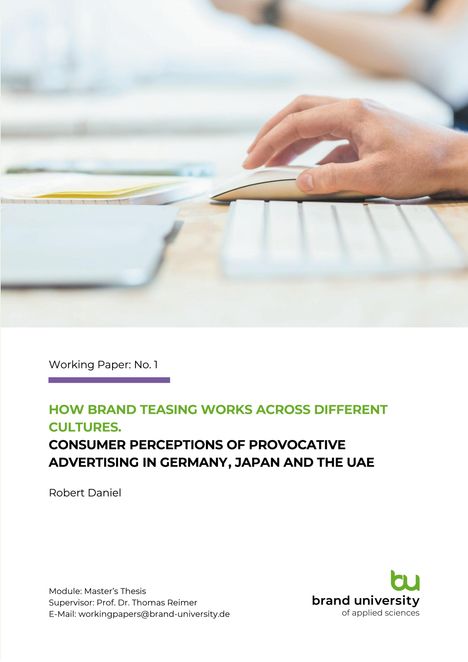Robert Daniel: How brand teasing works across different cultures, Kartoniert / Broschiert
How brand teasing works across different cultures
- Consumer perceptions of provocative advertising in Germany, Japan and the UAE.
(soweit verfügbar beim Lieferanten)
- Herausgeber:
- Yonca Limon-Calisan
- Verlag:
- BoD - Books on Demand, 11/2025
- Einband:
- Kartoniert / Broschiert
- Sprache:
- Englisch
- ISBN-13:
- 9783819273926
- Artikelnummer:
- 12537550
- Umfang:
- 36 Seiten
- Nummer der Auflage:
- 25001
- Ausgabe:
- 1. Auflage
- Gewicht:
- 136 g
- Maße:
- 297 x 210 mm
- Stärke:
- 4 mm
- Erscheinungstermin:
- 11.11.2025
- Hinweis
-
Achtung: Artikel ist nicht in deutscher Sprache!
Klappentext
Background While globalization fosters connectivity between people, consumers, and brands, cultural differences continue to shape how messages are perceived. Humor is widely recognized as an effective advertising strategy that can enhance engagement and brand recall. However, its effectiveness depends on cultural context, as different audiences interpret humor in varying ways. This makes studying the cross-cultural impact of humor in advertising important for both researchers and marketers.
Aim This study investigates how brand teasing (self-ironic advertising) is perceived across different cultural contexts. It aims to examine the moderating effects of cultural values and age on brand perception and determine whether humor mechanisms elicit different consumer responses in Western, Arab, and Asian markets.
Methodology An online experiment was conducted across Germany, Japan, and the UAE, using a single advertising stimulus manipulated into three levels of provocation: just funny (not teasing), pro-social teasing (playful, positive) and anti-social teasing (provocative, offensive). The study measured brand perception, brand trust, perceived provocation and funniness, with Hofstede's cultural dimensions (power distance, individualism, and uncertainty avoidance) as key independent variables.
Contributions By analyzing how cultural dimensions shape consumer responses to brand teasing, this thesis contributes to cross-cultural advertising research and provides insights into the effectiveness and risks of provocative brand communication. Findings are expected to bridge gaps in humor perception re-search and inform global marketing strategies by highlighting cultural sensitivities in brand messaging.
Keywords Cross-cultural advertising, cross-cultural humor, cultural dimensions, Hofstede, brand teasing, teasing communication, provocative brand messages, brand perception, brand anthropomorphism, consumer psychology.
Anmerkungen:
Bitte beachten Sie, dass auch wir der Preisbindung unterliegen und kurzfristige Preiserhöhungen oder -senkungen an Sie weitergeben müssen.

